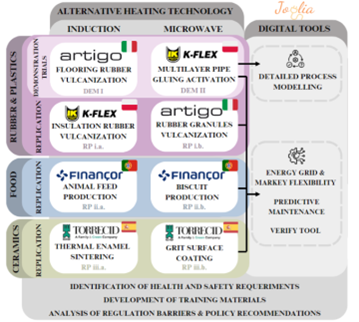JOULIA — Electrification of industrial processes using induction and microwaves technologies
JOULIA aims to support the energy transition of the industrial sector by demonstrating the flexibility, effectiveness and sustainability of two alternative fully electrified processes using induction and microwave technologies. Both contactless and electromagnetic heating technologies will be precisely applied to reach mid temperature in two demonstrations in the rubber and plastic sector.
-
An induction heating system will be integrated in a rotocure machine, thus electrifying the rubber vulcanization process (180º C).
-
An innovative microwave heating solution for the thermal activation of glue used in the manufacturing of multilayer pipes for insulating purposes. (100ºC).
Both routes based in previous prototypes which will be advanced to maximize energy efficiency and the system flexibility, thus increasing the integration of renewable energy sources (RES) and leading to near zero-emission processes. The data obtained will be used to demonstrate JOULIA technologies at TRL 7. These developments will be endorsed by the advancement and application of digital models and process simulations to design and operate the novel heating technologies. Additionally, a predictive maintenance tool will be developed to increase the safety of the system and ensure that the key process parameters are met. Health and safety requirements will be defined and implemented in the pilots and training materials will be developed and validated to address the needs of the workforce operating the processes. This way JOULIA will improve awareness and acceptance of their solutions while also constructing suitable business cases.

Background
The industry sector consumes half of the global heat energy, mostly used to apply heat in its manufacturing processes. Despite advances in technology, fossil fuels remain as the predominant energy source in industrial processes, being responsible of 40% of global CO2 emissions and being this fossil fuels combustion the source of 70% of the used heating energy. In light of this fact, as well as the inefficient electric systems and conventional heating processes with high energy losses, the switch to clean, efficient and flexible heating technologies become imperative for the sector’s strength and crucial to meet EU goals to achieve climate neutrality of the industrial sector by 2050. Particularly, medium-high temperature processes (100-500 ºC), e.g. polymerisation/vulcanization, drying, coating, or cooking, present significant opportunities for their electrification and to greatly increase their energy efficiency by integrating technology directly heating the required materials, due to their presence in multiple sectors (e.g. chemical, ceramics, food, textiles).
Aim and objectives
The main objective of JOULIA is to design, manufacture, implement and demonstrate new highly-efficient electromagnetic heating systems (i.e. induction and microwave) for medium-high temperature processes (100- 500ºC) and ensure a higher system flexibility to cope with the fluctuation of renewable energies, aiming to reduce dependence on conventional fossil fuel-based processes and achieve fully decarbonised heating processes. These technologies will be demonstrated in two demonstrators in the rubber and plastics industrial sector (i.e. vulcanization and gluing of multilayer pipes) and their application will be assessed in other processes in the rubber and plastic, food and ceramic sectors. To achieve that the project will:
-
Develop highly efficient and safe electric technologies and equipment that replace fossil-based heating systems in the rubber and plastic sector.
-
Develop and implement digital tools to improve the electric processes flexibility and to increase their safety and reliability with predictive maintenance.
-
Carry out a complete validation and demonstration program up to TRL 7 of the advanced electric heating technologies in 2 different industrial demosites.
-
Establish a roadmap for the replication of JOULIA solutions, considering economic viability, as well as the technical and regulatory obstacles in a large-scale deployment.
-
Assure a successful communication, dissemination and exploitation of the project, through strategic and business-oriented commercialization plans.
Project partners
-
CIRCE – Centro de Investigación de Recursos y Consumos Energéticos
-
ARTIGO S.P.A.
-
SIMIC S.P.A
-
STAM SRL
-
K-FLEX POLSKA SP ZOO
-
INNCEINMAT
-
Kungliga Tekniska Hoegskolan
-
CNET CENTRE FOR NEW ENERGY TECHNOLOGIES SA
-
Finançor Agro-Alimentar S.A.
-
Torrecid SA
-
Universita’ Degli Studi di Genova
-
Ethniko Kentro Erevnas Kai Technologikis Anaptyxis
-
Instituto de Soldadura e Qualidade
-
CORE INNOVATION AND TECHNOLOGY OE
-
WHITE RESEARCH SRL
Funding is provided by Horizon Europe (CINEA) - Grant Agreement No 101192555.
Timeframe: December 2024 – November 2028
Researchers
